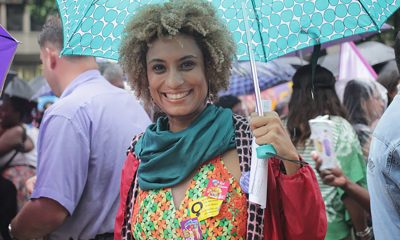South America
Bolsonaro ‘will destroy democracy’ in Brazil if re-elected
LGBTQ, intersex activists back Lula ahead of Oct. 30 runoff

Editor’s note: International News Editor Michael K. Lavers was on assignment in Brazil from Sept. 30-Oct. 11.
RIO DE JANEIRO — Michelle Seixas, the national political coordinator of Articulação Brasileira de Lésbicas (Brazilian Articulation of Lesbians), a group that advocates on behalf of lesbians in Brazil, was born in Complexo do Alemão, a complex of favelas in the northern part of Rio de Janeiro.
She spoke with the Washington Blade about her life, her work and Brazil’s presidential election on Oct. 10 during an interview at Espaço Democrático de União, Convivência, Apprendizagem e Prevenção (Democratic Space of Union, Coexistence, Learning and Prevention,) a community center in Complexo do Alemão known by the acronym EDUCAP that Prince Harry officially opened in 2012.
Local drug dealers built the soccer field that is next to EDUCAP. The Blade also saw public housing along one of Complexo do Alemão’s main streets that former President Luiz Inácio Lula da Silva’s government built through its Programa Minha Casa, Minha Vida (My House, My Life Program.)
“(President Jair) Bolsonaro to lesbian women in Brazil is the worst president in Brazil’s history,” Seixas told the Blade.
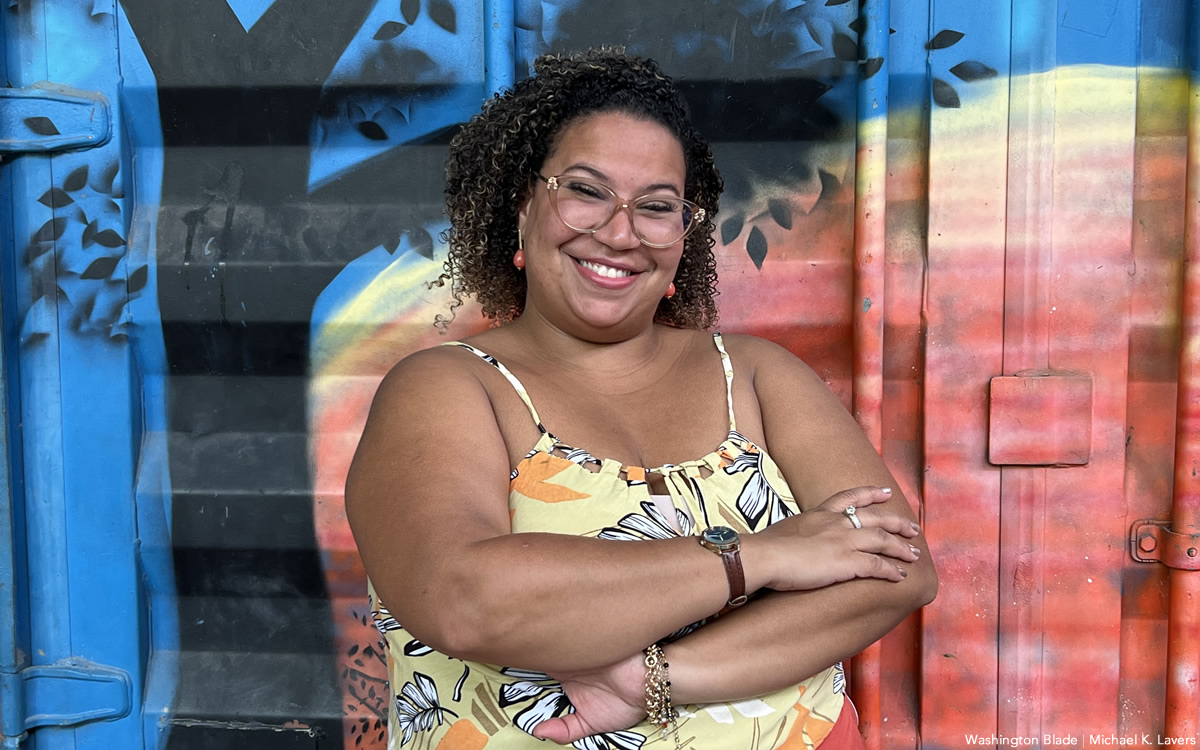
Mariah Rafaela Silva, a transgender woman of indigenous descent who works with the Washington-based International Institute on Race, Equality and Human Rights, translated for Sexias.
She, like Seixas, lives in Complexo do Alemão.
“We not only went backwards in social public policy, but we also went backwards in basic human rights,” said Seixas, referring to Bolsonaro.
“We know that there are many people who support Lula,” added Seixas.
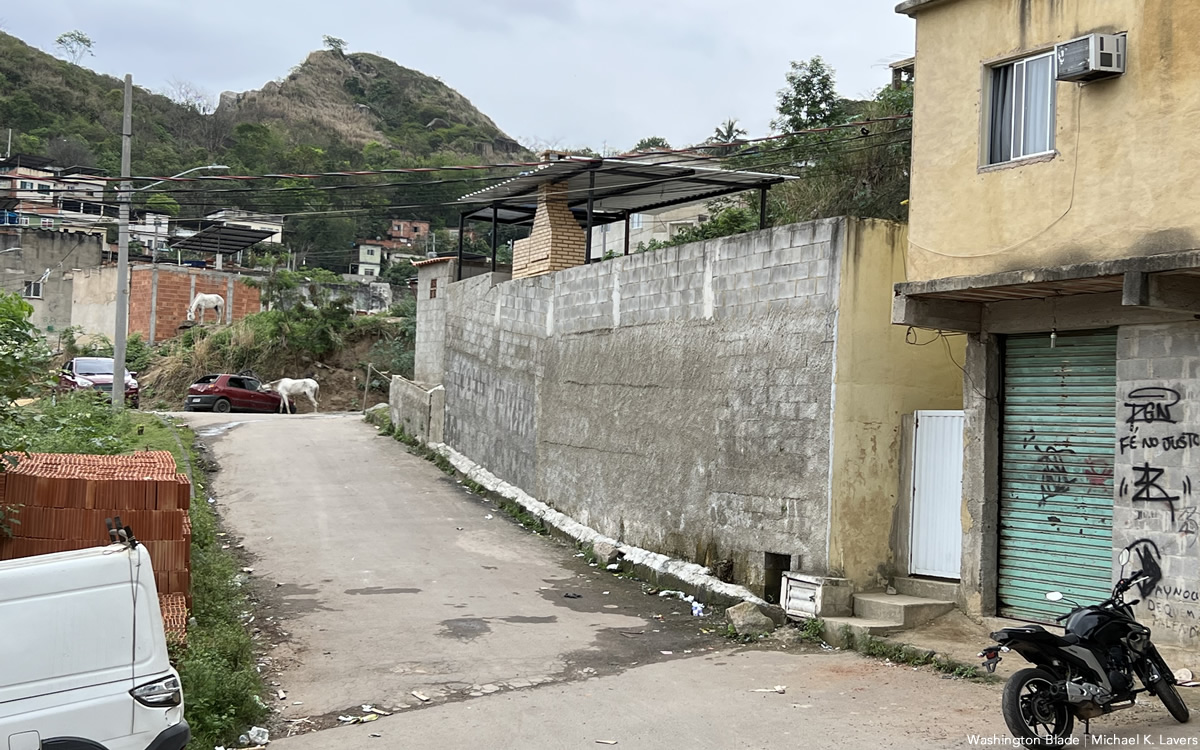
Seixas spoke with the Blade eight days after the presidential election’s first round, which took place on Oct. 2.
Da Silva defeated Bolsonaro by a 48.4-43.2 percent margin. They will face off in the presidential election’s second round on Oct. 30 because neither received a majority of votes.
Four of Bolsonaro’s previous Cabinet members — former Justice and Public Security Minister Sergio Moro, former Family and Human Rights Minister Damares Alves, former Agriculture Minister Tereza Cristina and former Science and Technology Minister Marcos Prutes — on Oct. 2 won seats in the Brazilian Congress. São Paulo Municipal Councilwoman Erika Hilton and Belo Horizonte Municipal Councilwoman Duda Salabert on the same day became the first openly transgender congresswomen.
Bolsonaro, a member of the right-wing Liberal Party, represented Rio de Janeiro in the Brazilian Congress from 1991 until he took office in 2018.
The former Brazilian Army captain has faced sharp criticism because of his rhetoric against LGBTQ and intersex Brazilians, women, people of African and indigenous descent and other groups.
He has encouraged fathers to beat their sons if they think they are gay.
Bolsonaro during a 2019 press conference in the White House Rose Garden stressed his “respect of traditional family values.” Bolsonaro has expressed his opposition to “gender ideology,” supports legislation that would limit LGBTQ-specific curricula in Brazil’s schools and condemned a 2019 Brazilian Supreme Court ruling that criminalized homophobia and transphobia.
A Brazilian Federal Police investigator in August called for prosecutors to charge Bolsonaro with incitement for spreading false information about COVID-19 after he said people who are vaccinated against the virus are at increased risk for AIDS. Bolsonaro’s efforts to discredit the country’s electoral system have increased concerns that violence could erupt if he does not accept the election results if he loses to Da Silva, a member of the leftist Workers’ Party who was Brazil’s president from 2003-2010.
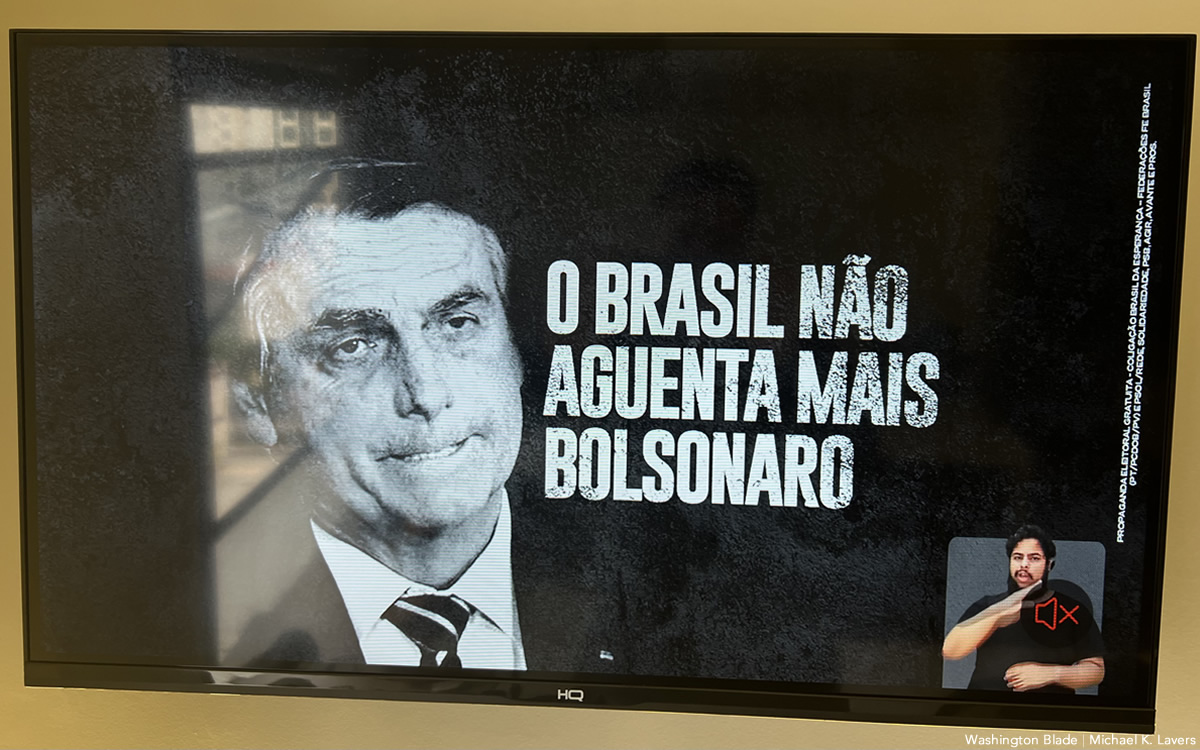
Moro, who was a judge before he joined Bolsonaro’s government, in 2017 sentenced Da Silva to 9 1/2 years in prison after his conviction on money laundering and corruption charges that stemmed from Operation Car Wash. The Supreme Court in November 2019 ordered Da Silva’s release.
Julian Rodrigues, who was the coordinator of the Workers’ Party’s National Working Group from 2006-2012, noted to the Blade during a previous interview that Da Silva in 2004 created the Health Ministry’s “Brazil without Homophobia” campaign. Rodrigues also highlighted Da Silva created the Culture Ministry’s Diversity Secretariat that, among other things, funded community centers and sought to make police officers and other law enforcement officials more friendly to LGBTQ and intersex people.
Da Silva during the campaign has publicly highlighted his support of LGBTQ and intersex rights.
“We know that the fight against prejudice and homophobia is a daily fight,” said Da Silva in a campaign video that Associaçao Nacional de Travestis e Transexuais (National Association of Travestis and Transsexuals), a Brazilian trans rights group known by the acronym ANTRA, shared on its Instagram page. “I have a lot of respect for all the gay, lesbian, bisexual, travestis and trans people who live in Brazil.”
View this post on Instagram
Hilton is among Da Silva’s more outspoken supporters. Lou Lou, a bar in Rio de Janeiro’s Ipanema neighborhood, and other establishments in the country that are popular among LGBTQ and intersex Brazilians also indicate their support for Da Silva with prominently placed stickers.

Cláudio Nascimento, president of Grupo Arco-Íris de Cidadania LGBT (Rainbow LGBT Citizen Group), an LGBTQ and intersex rights group in Rio de Janeiro, on Oct. 9 handed the Blade a sticker that read, “no LGBT votes for Bolsonaro” (“Nenhum voto LGBT em Bolsonaro”) before he sat down for an interview at his office.
Nascimento said Bolsonaro’s government and the federal government “hasn’t done anything for the community.” Nascimento also stressed Bolsonaro’s comments against LGBTQ and intersex Brazilians and other minority groups.
“He has also made speeches,” Nascimento told the Blade. “He speaks against the LGBT community. It stimulates hatred, stimulates persecution and stimulates violence, discrimination.”
Nascimento said he supports Da Silva because he does not represent a threat to democracy.
“Our concern is that if Bolsonaro is elected, he will destroy democracy from within democracy,” said Nascimento.
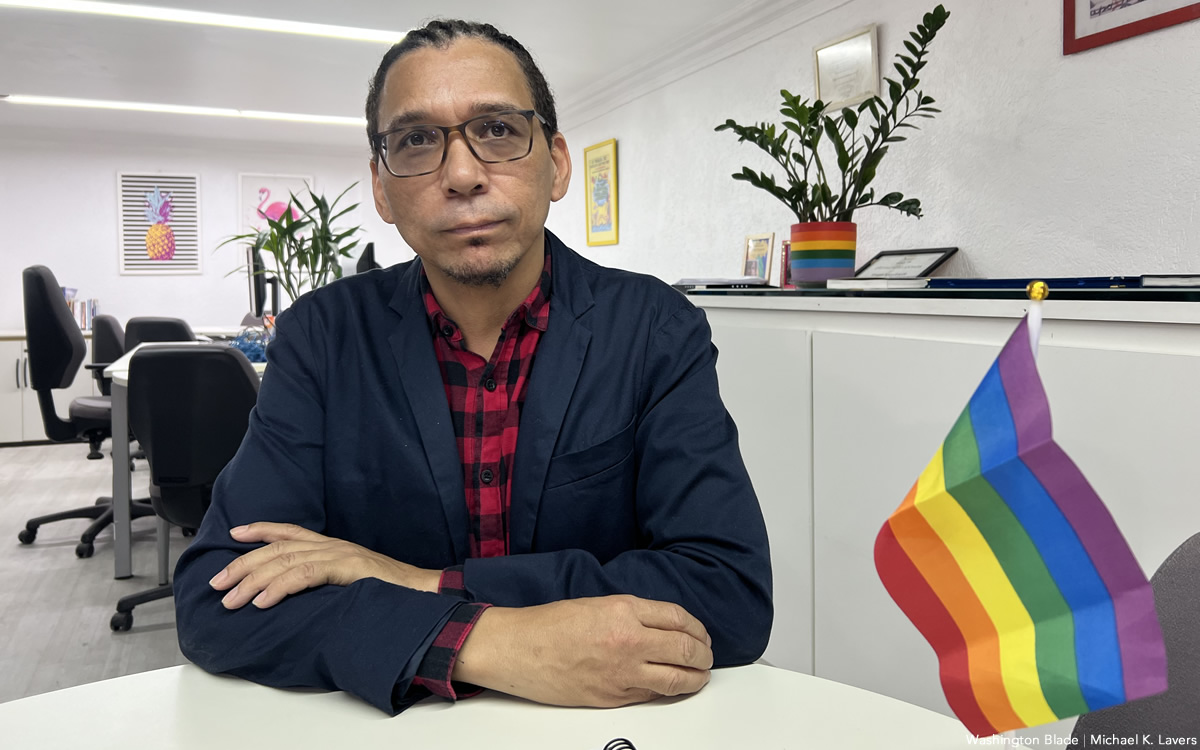
Patricia Mannaro, a lawyer who co-founded Aliança Nacional LGBTI (National LGBTI Alliance), a national LGBTQ and intersex rights group, echoed Nascimento when she spoke with the Blade at a São Paulo coffee shop on Oct. 5.
Mannaro said human rights in Brazil will “continue dying” if Bolsonaro wins re-election.
Voters in Lins, a municipality in São Paulo state, in 2012 elected Edgar Souza as their mayor.
Souza, who is Brazil’s first openly gay mayor, agreed with Mannaro when he spoke with the Blade on Oct. 6 at his São Paulo office.
“I am not voting for Lula because I’m in love with Lula,” said Souza. “I have a lot of criticism of Lula and the PT (Workers’ Party,) but Lula does not threaten democracy. He respects democratic rule and I respect institutions. He respects the separation of powers.”
“Bolsonaro would threaten all of that,” added Souza.

Renato Viterbo, vice president of Parada LGBT+ de São Paulo (São Paulo LGBT+ Parade) on Oct. 5 noted to the Blade during an interview at his office that marriage equality and most other LGBTQ and intersex rights advances in Brazil have happened because of court rulings, as opposed to legislation.
Viterbo said these advances could come under threat if Bolsonaro wins a second term, in part, because his party on Oct. 2 gained seats in Congress. Viterbo also stressed Bolsonaro continues to garner support in Brazil because he reflects attitudes that persist in the country.
“We are a sexist, anti-Semitic, racist and xenophobic country,” said Viterbo. “Democracy will be threatened if this government is reelected.”
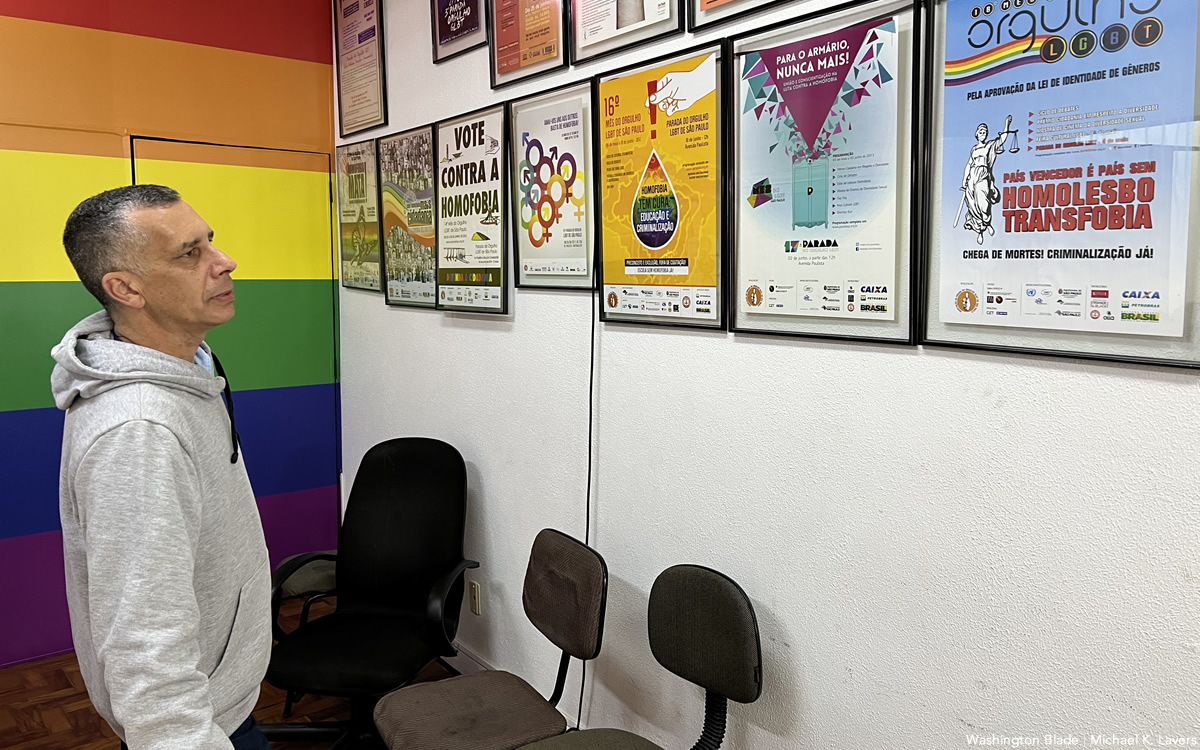
South America
Man convicted of killing Daniel Zamudio in Chile seeks parole
Raúl López Fuentes in 2013 sentenced to 15 years in prison
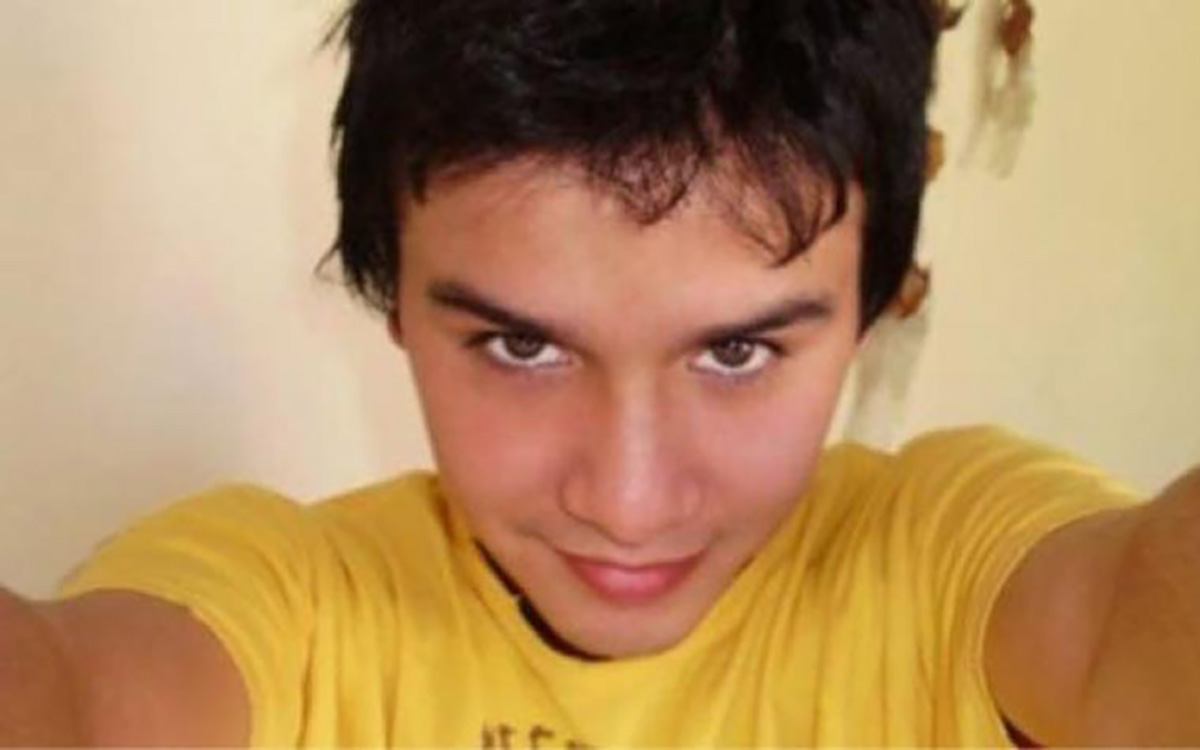
One of the four men convicted of murdering a young gay man in the Chilean capital in 2012 is seeking parole.
Raúl López Fuentes in 2013 received a 15-year prison sentence after he was convicted of killing Daniel Zamudio.
Zamudio was a young Chilean man who became a symbol of the fight against homophobic violence in his country and around the world after López and three other young men with alleged ties to a neo-Nazi group beat him for several hours in Santiago’s San Borja Park on March 2, 2012. Zamudio succumbed to his injuries a few weeks later.
The attack sparked widespread outage in Chile and prompted a debate over homophobia in the country that highlighted the absence of an anti-discrimination law. Lawmakers in the months after Zamudio’s murder passed a law that bears Zamudio’s name.
Patricio Ahumada received a life sentence, while López and Alejandro Angulo Tapia are serving 15 years in prison. Fabían Mora Mora received a 7-year prison sentence.
López has asked the Seventh Santiago Guarantee Court to serve the last three years of his sentence on parole. Zamudio’s family and Jaime Silva, their lawyer who works with the Movement for Homosexual Integration and Liberation, oppose the request.
Movilh represented Zamudio’s family after his murder.
Zamudio’s mother, Jacqueline Vera, during an exclusive interview with the Washington Blade said López’s petition “provoked all the anguish, all the commotion of his time.”
“It was very cruel because in fact two days before we were at Daniel’s grave, where it was 12 years since his death and the beating,” said Vera. “He really does not deserve it.”
“We have gone through very difficult moments,” she added.
The mother, who later created a foundation to eradicate discrimination in Chile, was emphatic in indicating that she and her family “do not accept the release of this guy because he is a danger to society and a danger to ourselves.”
“At the last hearing where they were sentenced, they told us that we are going to remember them when they get out,” said Vera. “They threatened us with death. There is a video circulating on social networks where they were in front of me and they laughed and made fun of me. They told me that I remembered that I had three more children.”
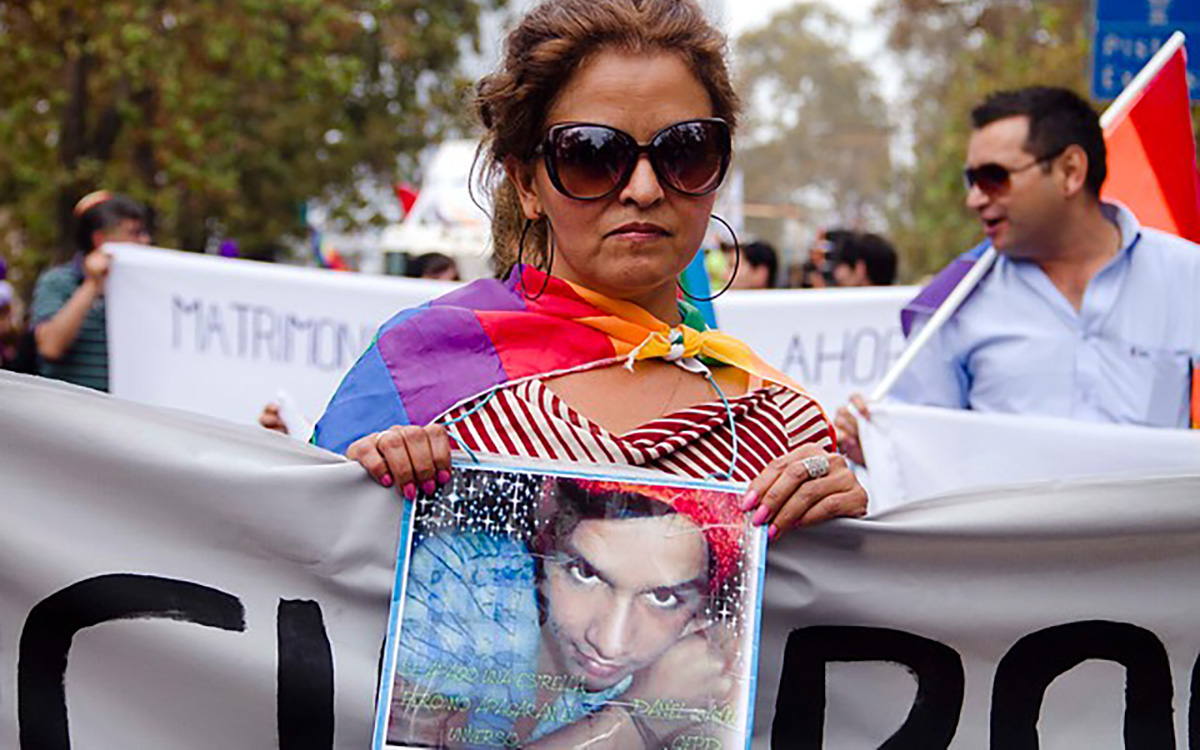
Regarding the possibility that the Chilean justice system will allow López to serve the remaining three years of his sentence on parole, Vera said “with the benefits here in Chile, which is like a revolving door where murderers come and go, it can happen.”
“In any case, I don’t pretend, I don’t accept and I don’t want (López) to get out, I don’t want (López) to get out there,” she said. “We are fighting for him not to get out there because I don’t want him to get out there. And for me it is not like that, they have to serve the sentence as it stands.”
LGBTQ Chileans have secured additional rights since the Zamudio Law took effect. These include marriage equality and protections for transgender people. Advocacy groups, however, maintain lawmakers should improve the Zamudio Law.
“We are advocating for it to be a firmer law, with more strength and more condemnation,” said Vera.
When asked by the Washington Blade about what she would like to see improved, she indicated “the law should be for all these criminals with life imprisonment.”
South America
Argentine president announces state institutions can no longer use inclusive language
Activists condemn Javier Milei’s anti-LGBTQ policies
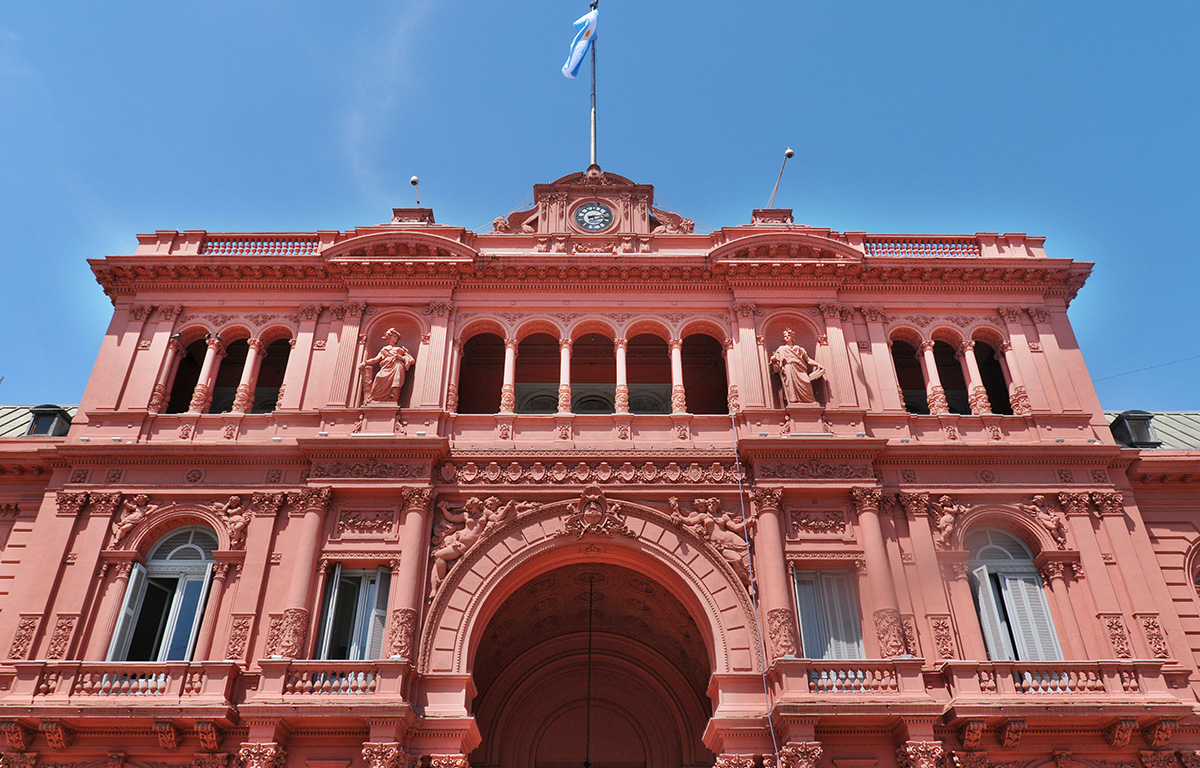
In a move that has generated concern and criticism throughout the country, Argentine President Javier Milei has announced government institutions can no longer use inclusive language and gender-specific references in their public policies.
This decision comes on top of other controversial measures, such as the closure of the Women, Gender and Diversity Ministry, and an announcement to shutter the country’s National Institute against Discrimination, Xenophobia and Racism.
Former Diversity Undersecretary Alba Rueda, a transgender woman who was the country’s special envoy for LGBTQ issues under former President Alberto Fernández’s government, and gay Congressman Esteban Paulón, in exclusive interviews with the Washington Blade discussed the impact of Milei’s announcement and the impact it will have on Argentine society in terms of human rights and protections for queer people.
“The State had been using the gender perspective and inclusive language to make visible the presence of women in key roles and to recognize nonbinary identities,” Rueda said. “This measure not only erases those advances, but also excludes people who are already recognized by the State in their nonbinary gender identities.”
Rueda noted Congress more than a decade ago “passed the gender identity law, which states in its first article that the State will respect the gender identity of all persons. After changes were made in the structure of the State to be able to generate identity documents, a series of court rulings that recognize nonbinary people in their nonbinary identity arose in 2016, and this (and) that remained unresolved during the Macrista government without recognizing the identity of nonbinary people.”
She pointed out Fernández’s government in 2021 issued Decree 746, which recognized “people with nonbinary identities, gender fluid and those who avoid naming their gender before the State.”
“The State already recognizes this citizenship and here comes that the prohibition of inclusive language excludes in the way of naming people who are already recognized by the State and that effectively the recognition of their gender identity is the condition of not being binary,” said Rueda. “So, the decree is in force, the law is in force, there are nonbinary people with their documents, but who today are not being named in all state documents.”
Paulón said the prohibition of inclusive language is a gesture of violence towards LGBTQ communities.
“Inclusive language has given entity and identity to an important part of the Argentine population,” he said. “This measure represents an act of harassment and violence towards those who identify with inclusive language, including the queer and LGBTQ+ collective.”
“Language is a social and cultural construction, and in Argentina today inclusive language represents and has given entity and identity to an important segment of the population and to a series of social collectives,” added Paulón. “Therefore, something that is not created by decree can hardly be eliminated by decree.”
The congressman told the Blade that Milei’s government announcement was “something that was clearly going to happen.”
“I don’t see the government campaigning in inclusive language or celebrating diversity,” said Paulón.
Milei’s decision has generated intense debate in Argentina, with critics arguing these measures represent a step backwards in the protection of human rights and an attack on diversity and inclusion. Milei’s supporters, on the other hand, defend these measures as part of an effort to promote conservative policies and reinforce national identity.
“It is very serious because it limits the exercise of citizenship and affects the nonbinary population, women and the trans population that is not recognized within the gender binarism,” said Rueda.
She noted Milei during his presidential campaign raised these issues, and has decided to implement policies that harm women and LGBTQ people.
“This is the gravity that is lived today in Argentina, that the Argentine head of state puts in confrontation and reduction of rights to women and LGBTIQ+ people,” Rueda added.
This ban on inclusive language and gender-specific policies has been announced against the context of increased political and social polarization in Argentina. With inflation at alarming levels and an economy in crisis, Milei’s government has sought to consolidate its base by adopting controversial measures that have generated division and unrest in Argentine society.
“That is the institutional and democratic gravity today in Argentina, that the head of state attacks and creates internal enemies and that position is accompanied by the media, amplifying a negative message about our communities,” Rueda said. “Of course that translates into social networks, but it also translates into the attacks that we LGBTIQ+ people experience in the public sphere.”
South America
Argentina’s president seeks to dismantle anti-discrimination agency
Activists have sharply criticized Javier Milei’s move

Argentinian President Javier Milei’s proposed closure of his country’s National Institute Against Discrimination, Xenophobia and Racism has sparked widespread criticism among LGBTQ activists and human rights defenders.
Alba Rueda, the former Undersecretary of Diversity Policies in the Women, Gender and Diversity Ministry who was also the country’s Special Representative on Sexual Orientation and Gender Identity under Alberto Fernández’s government, and gay Congressman Esteban Paulón in exclusive interviews with the Washington Blade talked about the Feb. 22 announcement’s implications and the impact it will have on Argentine society at a time marked by an acute economic, political and social crisis.
Rueda said INADI’s closure is a serious setback in the fight against discrimination and the advancement of human rights in Argentina.
“INADI is a human rights agency that has been in force in Argentina for almost 30 years, which emerged as a response to the international attacks we suffered,” she pointed out. “This body has been fundamental in the attention of discrimination cases, including strategic litigation such as the (murder) of Diana Sacayán (a prominent transgender rights activist) in 2015.”
Paulón said INADI’s closure is part of a broader policy of harassment towards diversity and state institutions that Milei’s government has carried out.
“INADI, along with the already eliminated Women Ministry, has been fundamental in the defense of the rights of LGBTQ+ and queer people,” said Paulón.
“In practical facts, the government cannot close INADI because INADI has been created by a law and it would require another law to close it,” he added. “Therefore, it has been raised that there is going to be a restructuring of personnel, a readjustment of resources that are going to continue processing complaints, but that they are going to pass to the orbit of the Justice Ministry, where INADI already is, but let’s say, they would pass without the institutionalism and that it would remain as an empty shell until the government achieves the consensus of a law to eliminate.”
Both agreed that INADI’s closure represents a serious setback in the protection of human rights in Argentina and a threat to the most vulnerable groups in society, including LGBTQ people. They also stressed Milei’s government has used this announcement as part of a broader strategy to dismantle democratic institutions and the country’s human rights agenda.
INADI cannot be closed unilaterally, despite the announcement, because a law created it and another statute would be required to dismantle it. There are, however, concerns the government may attempt to dismantle the institution or reduce its operational capacity.
“The decision to close INADI responds to an ideological position,” said Rueda. “They believe that INADI is the policeman of this, the ideological policeman. It is a body that functions autonomously whose president is appointed by the Congress and which also has a board of directors of social organizations.”
Critics of Milei’s government argue INADI’s closure is part of a strategy to consolidate power and repress dissent. They say the government is using the economic crisis as a pretext to implement authoritarian measures that limit civil liberties and weaken democratic institutions.
Milei’s supporters, on the other hand, defend the move as part of a broader effort to reduce public spending and promote liberal economic policies. They argue INADI’s closure is necessary to eliminate waste and corruption in government, and that its impact on human rights and LGBTQ protection is overstated.
“For LGTB people in particular, the closure of INADI would leave us without a place where we could basically receive attention in the face of discrimination,” Rueda pointed out. “And another issue that INADI also did is that it generated public policy recommendations or developed public policies for the prevention and awareness of these changes that have to take place in society.”
“So, not only do we run out of spaces for denunciation, but also of where to change this culture of discrimination, culture of discrimination that are present in the labor market that Milei presents or points out to you, as a success and that this is self-regulated,” she added.
-

 Africa4 days ago
Africa4 days agoCongolese lawmaker introduces anti-homosexuality bill
-

 District of Columbia16 hours ago
District of Columbia16 hours agoReenactment of first gay rights picket at White House draws interest of tourists
-

 World4 days ago
World4 days agoOut in the World: LGBTQ news from Europe and Asia
-

 Arizona20 hours ago
Arizona20 hours agoAriz. governor vetoes anti-transgender, Ten Commandments bill

